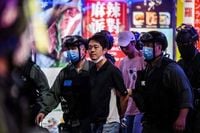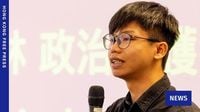Two prominent Hong Kong pro-democracy figures, Tony Chung and Ted Hui, have been granted asylum in the United Kingdom and Australia, respectively, after years of mounting pressure and legal pursuit by Hong Kong authorities. Their cases, announced over the weekend of August 16-17, 2025, underscore the ongoing international ramifications of Beijing’s sweeping national security law and the increasingly fraught landscape for political dissidents from the former British colony.
Tony Chung, a 24-year-old activist and the former convenor of the now-disbanded pro-independence group Studentlocalism, received confirmation of his refugee status and a five-year residence permit from the UK Home Office in early August, according to a letter he shared publicly. As reported by Hong Kong Free Press and Associated Press, Chung’s asylum was granted on the grounds of a “well-founded fear of persecution,” with British authorities recognizing the risks he faced under Hong Kong’s national security regime.
Chung’s journey to the UK was marked by turbulence and risk. After being sentenced in 2020 to nearly four years in prison for secession and money laundering—charges stemming from his advocacy for Hong Kong independence—he was released on supervision. Though barred from leaving Hong Kong for a year, he obtained permission to travel to Japan for Christmas in December 2023. Instead of returning, he continued on to Britain, seeking sanctuary. This move, as detailed by Hong Kong Free Press, violated his post-release conditions and led to his designation as a fugitive by Hong Kong authorities in December 2024.
Chung has not shied away from sharing the emotional toll of his activism. On social media, he revealed ongoing struggles with depression and the need for medical treatment, including anti-depressants, since his 2020 arrest. Yet, he remains steadfast in his commitment. “Despite everything, I will not give up,” he wrote, vowing to continue his advocacy from abroad.
Ted Hui, a former lawmaker known for his outspoken stance in Hong Kong’s Legislative Council, also found himself in the crosshairs of the city’s new security apparatus. Hui fled Hong Kong in December 2020 while facing trial for his participation in the massive anti-government protests that swept the city in 2019. Now working as a lawyer in Adelaide, Australia, Hui announced on Facebook that he, his wife, children, and parents had been granted protection visas by the Australian government.
“I express my sincere gratitude to the Government of Australia—both present and former—for recognising our need for asylum and granting us this protection,” Hui stated, as quoted by Associated Press and CNN. “This decision reflects values of freedom, justice, and compassion that my family will never take for granted.”
Hui’s activism was not without incident. In a memorable moment in Hong Kong’s Legislative Council, he threw a rotten plant to halt debate on the National Anthem Law—an act that resulted in a HK$52,000 fine. His defiance made him a target; in December 2024, the Hong Kong government canceled the passports of Hui and six other overseas-based activists under a new homegrown security law, further intensifying efforts to restrict their movement and influence.
Both Chung and Hui are among dozens of activists wanted by Hong Kong authorities, with police bounties of up to HK$1 million (about US$127,800) placed on their heads. Their cases are emblematic of a broader exodus of political dissidents since Beijing imposed the national security law in June 2020. The legislation criminalizes subversion, secession, collusion with foreign forces, and terrorism—terms so broadly defined that, according to Associated Press and CNN, hundreds have been arrested and numerous civil society groups have been forced to disband.
The Hong Kong government, for its part, has responded with fierce condemnation of foreign governments offering sanctuary to its fugitives. In a statement released over the weekend of August 16-17, 2025, officials accused countries like the UK and Australia of “harbouring criminals,” declaring, “Any country that harbours Hong Kong criminals in any form shows contempt for the rule of law, grossly disrespects Hong Kong’s legal systems and barbarically interferes in the affairs of Hong Kong.” The statement, reported by Associated Press and Hong Kong Free Press, continued: “Turning a blind eye to the offences committed by the criminals and disregarding the potential security threats posed to the local community and residents, they shall eventually bear the consequences of what they have done.”
Beijing and its allies maintain that the national security law has restored stability and peace to Hong Kong following the unrest of 2019. Critics, including trade partners, the United Nations, and numerous NGOs, counter that the law has gutted the city’s civil liberties, criminalized dissent, and set alarming precedents for freedom of expression and assembly. The resulting climate has prompted a wave of migration, with many activists seeking refuge in countries with robust human rights protections.
While British and Australian authorities have refrained from commenting on individual asylum cases, the decisions to grant protection to Chung and Hui are seen by observers as significant gestures of support for democracy and human rights. As noted by CNN and Mezha, these cases highlight the long-term impact of political repression in Hong Kong on global migration flows and the policies of asylum-granting countries.
For many in the international community, the stories of Tony Chung and Ted Hui are more than individual tales of escape—they are symbols of a wider struggle over the future of Hong Kong’s freedoms, the reach of Chinese legal authority, and the willingness of the world to offer safe haven to those who resist authoritarian rule. As the city’s crackdown continues and authorities vow to “use all legal means to pursue and combat criminals who endanger national security,” the fates of exiled activists remain a flashpoint in the ongoing debate over sovereignty, justice, and human rights.
Amid these challenges, both Chung and Hui have made it clear they intend to keep fighting for the values that forced them into exile. Their new lives in the UK and Australia may be far from Hong Kong, but the causes they champion—and the risks they face—continue to resonate far beyond the city’s borders.



